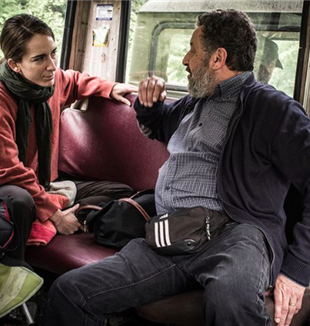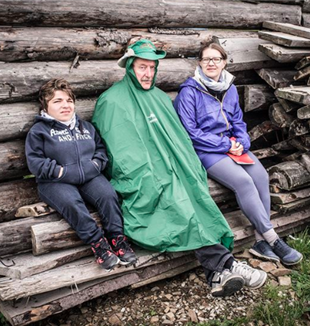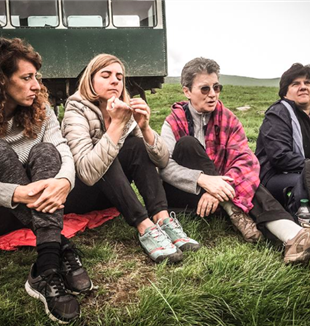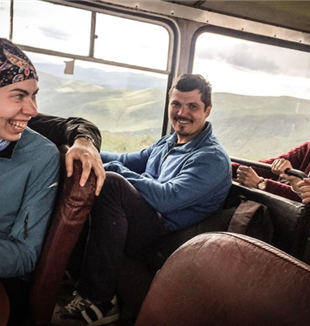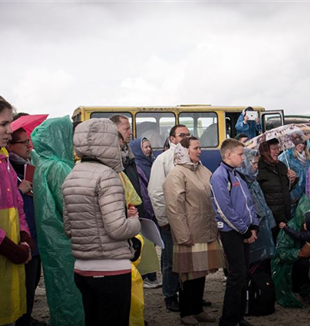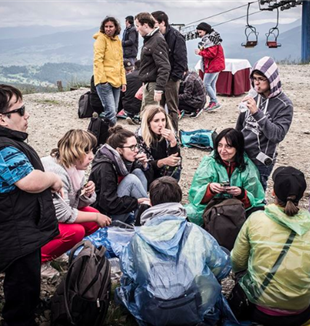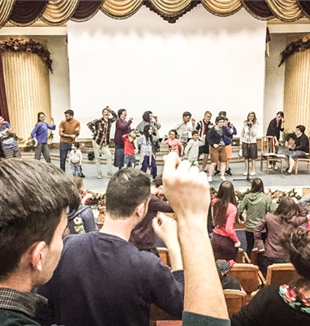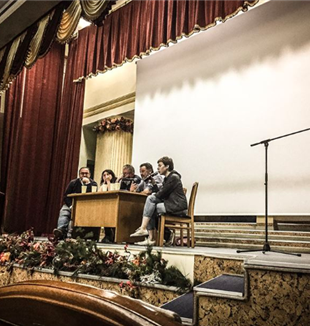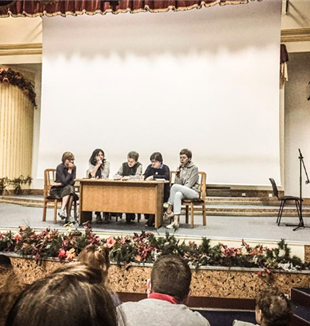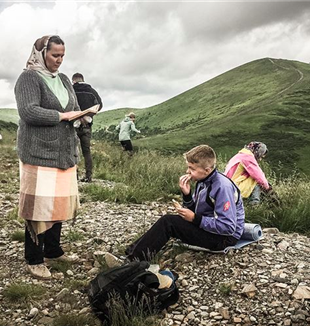
The "Flying Community" Lands in the Carpathian Mountains
This year marked the first summer vacation in Ukraine. Its participants came from various different countries and left with this question: "Would you leave Him for another love?"Caterina and Elena Gregorevna are respectively five months old and eighty-five years old. They were the youngest and oldest participants of the “flying community’s” first vacation, which took place June 24-30, 2018, in Jaremče in the Carpathian Mountains of Ukraine.
Despite the long journey to reach their destination (it took Elena Gregorevna herself nearly 24 hours from Moscow, as it did for Aleksandr, who traveled from Odesa with his wife and kids), 140 people attended from Ukraine, Russia, Belorussia, Germany, Switzerland, Spain, and Italy. Also among them were the kids from Kharkov’s “Flying House” (Lena, Tanja, Lena, Ira, Daria, Julia, Vitalik, and Oleg), a home for disabled young adult orphans.
Some attendees were Orthodox, some Roman Catholic, and others Protestant. However, those differences were barely perceptible, if not as a richness to be shared. In fact, the Orthodox liturgy and the Catholic Mass were proposed to all on alternate days.
After the sudden death of Ilarij, Archbishop of Makarov and vicar of Kiev, in March, it was as if a crucial point of reference for the community’s Orthodox friends had gone missing. However, a young Orthodox bishop decided to participate to this year’s vacation, bringing four seminarians along with him.
“What is it that allows me to recognize You, God?” Aleksandr Filonenko and Elena Mazzola began the first evening with this question. The night was dedicated to welcoming everyone with songs from different traditions, and even some signing for the children. This allowed the many kids present to immediately become protagonists. 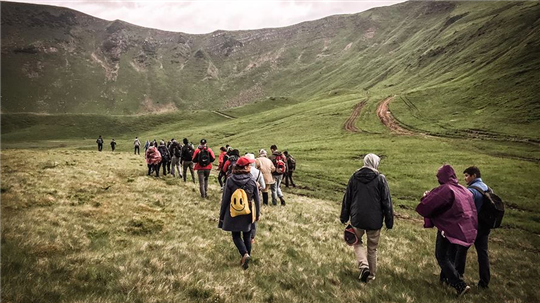
The following days were marked by daily meetings including two assemblies at the beginning and at the end of the vacation. There was no lack of hikes and, thanks to the old military vehicles revamped to tourist buses, even those unable to walk could participate. In addition, there were games and witnesses.
Franco Nembrini, teacher and educational writer, went to the vacation with his wife and a few friends to present Miguel Mañara. He spoke of life as a battle because “everything can either be killed, like a flower ripped from the earth, or loved.” He explained that what matters is finding a friend who, as the abbot to Miguel, will ask us, “Who do you seek today? What do you truly need?” Milosz’s drama was also showcased as proof that even the worst evil can be forgiven, won over, and transformed.
In fact, many witnessed to this during those days. At the final assembly, Anja from Kiev recounted the loss of her child and her immense pain that only now she is beginning to “perceive as a grace because never have I desired to see the resurrection as I do now.” She adds that this change was not automatic, but due to “an ability to look which can be learned along the journey.”
We often don’t see because we demand things from others, but “the problem is my gaze,” said Alesha. “Just seeing how my community from Kiev is living during these days, I go home with great anticipation to look at this joy together.” Marfa, shaken by a relationship she cannot sustain herself, spoke of pain, but she realized that “in order to love, we need help from a Third party, from the community!”
“The most difficult wound to embrace is not tragedy or struggle, but love,” said Silvio Cattarina, founder of Pesaro’s rehab community “L’Imprevisto,” during his witness alongside his daughter Augusta and his coworker Grazia. “My heart needs a continuous miracle, a new measure, a new gaze.” A gaze like the Sisters of Martinego (the Sisters of Charity of the Assumption) have for the families they take care of and the friends of the flying community. In fact, Sister Mariangela, Sister Valentina, and sister Maria Chiara traveled from Milan to attend the vacation. They shared those days with the community, playing, hiking, attempting to meet everyone with curiosity, and, with their presence, witnessing that “the Lord attempts to take you by bringing you to strange places and making life big and beautiful.” Sister Maria Chiara recounted how it is possible to stay close to others even in the midst of great pain, communicating through small things such as singing a children’s song.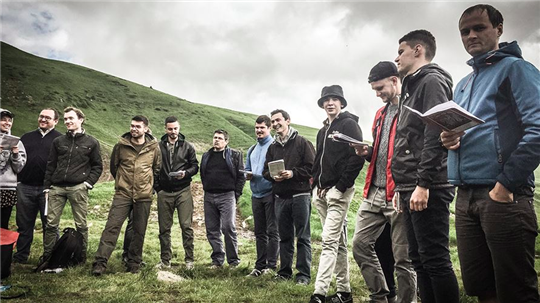
Many attendees' lives were changed through seemingly small occurrences that were either retold at the assemblies or during their evenings together, or given glimpses of through gestures, songs, or proposals on the final night of the vacation.
Natasha, Ksisha, Vadim, Orazio, and Alina told the group about themselves during an evening dedicated to the theme of discipleship. “It’s not God that makes life easier. Sometimes, I run away. But when I have enough strength to remain attached to Him, what He gives me is always the hundredfold,” said Natasha from Kharkov. Ksisha, a Byelorussian painter, told the group that she understood that “you are my family, in the true Christian sense.” Vladim from Kiev went back to the movie the group watched on the vacation, The Man Without a Face. “I realized I’m like the protagonist who stares at himself and looks into nothingness. But then, a voice drags him out and puts him to work. That is the Movement.” Orazio, a Sicilian living in Brescia, said that he had suffered much trying to be accepted and forgiven. “But when I gave in, my life changed and brought me all the way here to Ukraine, all thanks to a ‘yes’ said to a friendship with some people in Brescia.” The last to speak was Alina who has been attending the Kharkov School of Community for the past year. She spoke of her willingness to take off for a charitable mission in Peru; “Christ is real, and I am not afraid to lose Him, wherever I may go.”
These were precious days, rich with different but intertwined lives, with wounded but battling people who let themselves be struck by an encounter, by a true word they read or heard. The beauty of those present, of the Kharkov Memores Domini and the kids from the “Flying House,” surpassed that of the Ukrainian mountains. The orphans and the disabled, most of all, never backed down: they participated in the games, the hikes, and the singing, and they joked around, laughed, and comforted others; they wanted to be present. They were the ones to show everyone that pain, whether it be past or present, is defeated by love.
“We have these vacations to recognize with our whole selves that love is true, and that Christ is risen,” were Elena Mazzola’s concluding words before the final gesture of the vacation: the choral piece Cristo al Morir Tendea. “If He gives His heart and soul to draw you to Heaven, would you leave Him for another love?” Everyone went back home filled with the desire not to leave Him and with a—flying—community to keep following Him.
